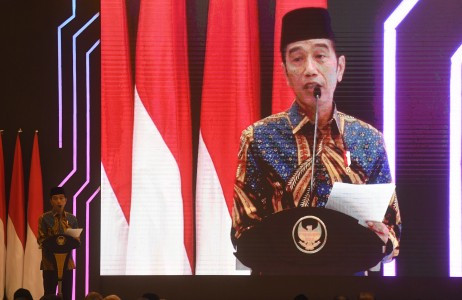Popular Reads
Top Results
Can't find what you're looking for?
View all search resultsPopular Reads
Top Results
Can't find what you're looking for?
View all search resultsDoubting the economic team
A September World Bank report on Indonesia cites bureaucratic red tape, inertia, overlapping regulations, too many discretionary decisions by ministers and regional government rules that contradict Jokowi’s policies and excessive import and export administrative procedures. All these problems have cut Indonesia off from the global supply chain, consequently making it unattractive to foreign direct investment (FDI).
Change text size
Gift Premium Articles
to Anyone
M
ajor political turbulence in the last two weeks of September, when the then outgoing House of Representatives flexed its muscles to force President Joko “Jokowi” Widodo to weaken the Corruption Eradication Commission (KPK), raised an alarm about the kind of Cabinet — notably the economic team — he plans to set up for his second term beginning later this month.
The ease in which Jokowi compromised one of his top working programs — bureaucratic reform — after his big win in the last election caused many business leaders and analysts to doubt his economic management and leadership during the next five years, as he has to manage and balance the competing interests of his coalition parties.
True, the President has a new House to work with and more than 50 percent of the House members are new. But because House members have to fully toe the directives and lines of their parties or find themselves replaced, and observing how the leaders of his coalition parties allowed Jokowi to encounter such political turbulence, investors are worried about his ability to implement his reform measures.
This perception was strikingly different from a few months ago after Jokowi won the April election. Businesspeople and analysts then were bullishly confident that the President, supported by his majority coalition in the House, would be able to accelerate his reform programs because he would have stronger political courage to implement bolder, though painful, reforms for the long-term good of the economy.
But businesspeople, already seeing many policy pronouncements and observing how so many measures have failed to materialize, are likely to wait and see how the President goes about pushing through his reform agenda. And the reforms Jokowi should implement are much more difficult and complex than the "low-hanging fruit" reforms previously implemented.
Yet more worrisome, the new People’s Consultative Assembly (MPR) has started a move to amend the Constitution in a bid to tighten its control of the President, thereby weakening the executive power of the government.
A September World Bank report on Indonesia cites bureaucratic red tape, inertia, overlapping regulations, too many discretionary decisions by ministers and regional government rules that contradict Jokowi’s policies and excessive import and export administrative procedures. All these problems have cut Indonesia off from the global supply chain, consequently making it unattractive to foreign direct investment (FDI).
One of the most politically sensitive reforms is related to the importance of openness to manufacture FDI and the international market to strengthen economic competitiveness. Most surveys have concluded that countries sitting at the top ranks of the competitiveness index are those economies that denote openness in regard to imports, foreign capital and skilled workers, as well as more flexible labor rules.
The first test of investor confidence in Jokowi’s economic policies and management will be the actions of his economic team in the next five years, when the global economy encounters its biggest challenges since the 2008 global financial crisis.










